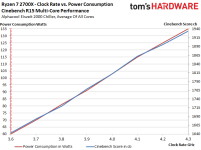Not really an observation, more of a comment.
The context was gotten, i was replying on the simple fact that people are getting hung up on higher numbers.
The point in these chips, why we all do this, is better performance. More fps in games, quicker renders, etc.
Whilst i dont disagree that for marketing high numbers would be nice, at the end of the day, when it comes down to it, if AMD released the next Zen at the same clock speed but it was 20-30% quicker, would we really care?
Whatever way performance comes we'll either laud AMD for improving clocks, laud them for getting more performance per clock, or criticise them for missing out on keeping their momentum going.
People who get hung up on bigger numbers, need to calm down and take a step back, as long as we get the performance, the methods are moot.
Lastly, the attitude given was not constructive to the conversation.







